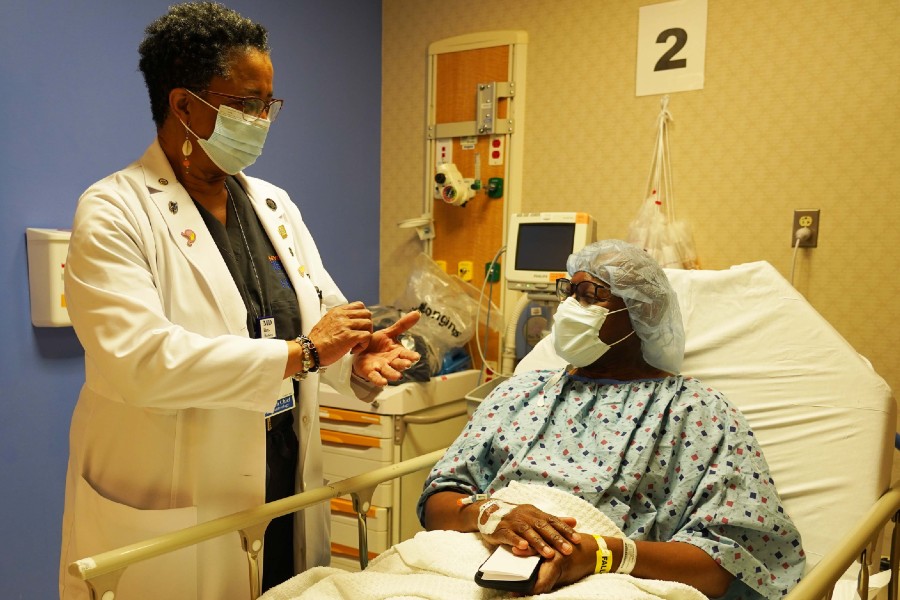
Healthcare advocates and community outreach workers are deeply concerned about dire consequences for persons affected by a breast cancer diagnosis if the Affordable Healthcare Act (ACA) is dismantled.
The National Black Leadership Commission on Health, Inc (NBLCH) underscores that the general population affected by the loss of the ACA is some 20,000,000 Americans.
The National Black Leadership Commission on Health, Inc (NBLCH) underscores that the general population affected by the loss of the ACA is some 20,000,000 Americans. Central to protecting the Affordable Care Act is the high incidence of breast cancer among African American women—many women discover a late-stage diagnosis that could have been thwarted with early detection.
Early detection through mammograms, covered under the ACA. The organization is also careful to point out that significant progress has been made in the discovery, care, and treatment of breast cancer since the ACA became law. Conversely, women and men with a cancer diagnosis will hang in the balance without access to affordable healthcare in the US.
Related: C. Virginia Fields Talks Harlem, AIDS, The COVID Crisis And More On The Danny Tisdale Show.
Often referred to as Black Health, NBLCH, www.nblch.org, is placing a spotlight on breast cancer survivors, inviting persons to share their remarkable stories of resilience as part of its advocacy to protect the ACA.
Participants can share their stories, no more than 250 words, at the following email address, info@nblch.org.
One of the breast cancer survivor stories features Jackie Pugh Mungo who received a breast cancer diagnosis some 30 years ago—she has since lived cancer-free for decades.
Jackie has always been an engaged community advocate since her time with the American Cancer Society. Active among a sisterhood centered on improving health outcomes within the African American community, her allegiance remains intact.
Down through the years, Jackie has been an effective stalwart to an untold number of cancer survivors; present day, she works in an administrative capacity at a well-known church, known for its support of: families in crisis, the incarcerated, food despair, homelessness, and under-employment.
Her life’s course bears a mirror reflection of what is more common than not–multiple health disparities exacerbated by mental anguish–wreaking an emotional toll that can ignite otherwise dormant carcinogens within the body. In other words, intense stress can lead to cancer; it is a proven fact, here.
Jackie explains, “As I reflect on being a breast cancer survivor for over 30 years, it has become more than a passion to educate women on the importance of breast self-examinations as well as yearly mammograms. I am keenly aware that cancer can be a terrifying experience and would not wish that anyone faces cancer alone. I am available to share my story and to let women know that a diagnosis is not a death sentence. Since being diagnosed I have started a nonprofit, The Healing Institute Global Network, and make it my mission to help anyone that I can.”
Black Health has a vested interest in persons affected by a breast cancer diagnosis. The organization welcomes participation from breast cancer survivors, nationwide, to share their stories of resilience as they seek to compile a compendium of testimonials that will bolster its ACA advocacy.
Although Black and White women get breast cancer at almost the same rates, Black women are 40% more likely to die from breast cancer than White women. Black women are also more likely to develop more aggressive forms of breast cancer. Despite this, Black women often get fewer breast cancer tests, also known as mammograms, and Black women often get their first mammogram later in life than White women.
Although Black and White women get breast cancer at almost the same rates, Black women are 40% more likely to die from breast cancer than white women. Black women are also more likely to develop more aggressive forms of breast cancer. Despite this, Black women often get fewer breast cancer tests, also known as mammograms, and Black women often get their first mammogram later in life than white women.
Because Black women are considered to be at high risk for breast cancer, every Black woman should visit their doctor for a breast cancer risk assessment by age 30.
Because Black women are considered to be at high risk for breast cancer, every Black woman should visit their doctor for a breast cancer risk assessment by age 30. Healthy lifestyle choices—diets with lots of fruits and vegetables, exercise, and avoiding all tobacco (including electronic cigarettes/vapes)—are all important in preventing all types of cancer and help live a healthier, happier life.
C. Virginia Fields, President, and CEO
National Black Leadership Commission on Health, Incorporated
www.nblch.org
Photo credit From the NBLCH website.
Become a Harlem Insider!
By submitting this form, you are consenting to receive marketing emails from: Harlem World Magazine, 2521 1/2 west 42nd street, Los Angeles, CA, 90008, https://www.harlemworldmagazine.com. You can revoke your consent to receive emails at any time by using the SafeUnsubscribe® link, found at the bottom of every email. Emails are serviced by Constant Contact








